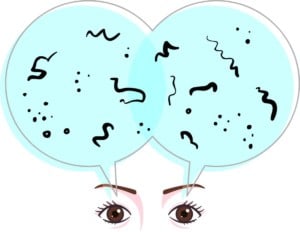 While it’s normal to have occasional itchy, red eyes due to common allergies or extra screen time, some seemingly minor vision issues can be red flags for severe eye disease. Our eye care specialists at Austin Eye recommend regular eye exams. Schedule an appointment if you notice sudden vision changes or have concerns about these problems:
While it’s normal to have occasional itchy, red eyes due to common allergies or extra screen time, some seemingly minor vision issues can be red flags for severe eye disease. Our eye care specialists at Austin Eye recommend regular eye exams. Schedule an appointment if you notice sudden vision changes or have concerns about these problems:
1. Eye Pain
Eye pain can indicate inflammation in the eye and could be a warning sign of undiagnosed glaucoma. If you have sudden or severe eye pain that lasts longer than a few minutes, see an ophthalmologist to investigate the cause of your discomfort. In the meantime, avoid rinsing or applying pressure to the eye(s), because doing so can worsen the symptoms.
2. Blurred Vision
Various lifestyle, environmental and genetic factors come into play for blurred vision. It might be dry eyes due to certain medications, wind or smoke, screen use or wearing contacts longer than recommended. Go to the emergency department right away if you experience sudden blurred vision or vision loss.
Some of the eye diseases or conditions associated with blurry vision include:
- Cataracts: Blurred eyesight accompanied by hazy vision where your environment looks like you’re peering through glass, could be a cataract forming.
- Age-related macular degeneration (AMD): If your blurred eyesight is only in your central field of vision, it could indicate AMD or a macular pucker or hole. The macula is in charge of facial recognition and reading. Vision loss from AMD could be gradual or rapid.
- Diabetic retinopathy: The longer you have diabetes, the more likely it will affect your eyes and cause retinopathy. Uncontrolled blood sugar levels damage the blood vessels in your retina, causing blurred vision and eventual blind spots.
- Pregnancy: Hormonal changes during pregnancy can lead to blurry vision and dry eyes, but these vision changes need monitoring because they can signal high blood pressure or gestational diabetes.
Blurred vision is cause for a call to Austin Eye to schedule an eye exam to diagnose or rule out these eye diseases and medical conditions.
3. Redness
Late nights, long swims and allergies can lead to red eyes. Redness can point to an eye infection, blocked tear duct or conjunctivitis (pink eye) when coupled with tearing. Light sensitivity, alcohol consumption and temperature changes can also cause tearing, redness and dry eyes. Pink eye is well-known for being highly contagious when the culprit is bacteria or a virus, but exposure to allergens, irritants or chemicals can also cause conjunctivitis.
4. Eye Floaters and Flashing Lights
Not all eye floaters are concerning. When these squiggles are larger or more frequent and accompanied by flashes of light, you need to see an ophthalmologist immediately. This combination of symptoms often signals retinal detachment. The retina is the soft, thin tissue lining the back of the eye, and it can separate and lose function, causing permanent vision loss if it’s not reattached as soon as possible. Retinal detachment can occur suddenly or be a gradual process. On top of eye floaters and flashing lights, you may feel like you’re looking out from underwater or have shadows in your field of vision.
5. Double Vision
Seeing double can be an issue with your cornea or a neurological problem. While dry eyes are another potential reason for double vision, cataracts, aneurysms and brain disease are associated with duplicate images too. If you also experience slurred speech and pain, go to the emergency room right away. Double vision that goes away when you close one eye is not as serious but still a good reason to schedule an eye exam to improve your eyesight and address astigmatism, dry eyes, eye misalignment or whatever the underlying cause.
Schedule an Eye Exam to Investigate Your Vision Changes
If you are experiencing any of these vision abnormalities, contact our eye care specialists at Austin Eye by calling our office at (512) 250-2020 to schedule a consultation.







